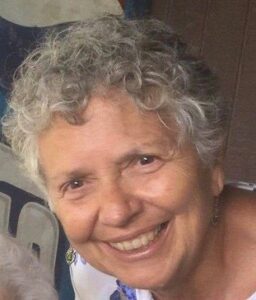We’re vulnerable, but so are the warheads
by Molly Rush
I have admired Dan and Phil Berrigan since they burned draft records. I did visit Jonah House and met Liz McAlister and their young children.
I learned about a planned protest at General Electric (G.E.) from John Schuchardt and I expressed interest, so he drove me to the retreat to pray and plan for a nonviolent action to protest G.E.’s production of Mark 12A nuclear warheads.
It was a serious decision because my two youngest sons of our six children were just 12 and 15. But it was the height of the Cold War and we lived under the very real threat of nuclear war. I was very worried if they’d live to grow up.
So in fear for their lives, I was determined to take what steps I could. I became a part of what came to be called the Plowshares Eight.
In the 1970s, I’d been arrested several times with members of the Thomas Merton Center at Rockwell International’s Pittburgh headquarters in protest of the B-1 bomber.
On one occasion, sixteen of us entered the reception room just before closing time. We refused to leave and we all stayed the night and then were arrested.
My husband Bill was very much opposed to my involvement in the G.E. action. Three of my brothers came to the door at midnight to try to convince me to change my mind. But seeing my determination, James said, “Molly, why don’t you put up a cross in the front yard and hang yourself on it!”
“But James, what would the neighbors say?” They gave up and left.
After I left home, I don’t know how he learned of the plan, but James called the FBI and told them the details. He wanted them to stop us. After I returned home he took me out for coffee and, looking guilty, he told me of how upset he was that they failed to do so. “Oh, James, I understand.”
On September 9, 1980, we drove to G.E. in King of Prussia, Pennsylvania. The question was how to get inside. It was very early morning before the workers arrived.
So we just walked in. The security guard behind the desk reached for the phone, but Fr. Carl Kabat and Sr. Anne Montgomery put their hands over it. We walked right past them and entered the nondestructive test area.
On tables sat the unarmed warheads. They were not much larger than highway cones. Some were very thin, gold colored with tiny spiraling grooves. The others were covered with a dark coating material to protect them from the atmosphere as they raced to their targets.
We had small hammers. I banged my small household hammer on one of the warheads and made a small hole in it. A tiny piece hit me under my chin. I was able to put dents in the other one.
I thought, they’re not really invulnerable. They’re really not. We’re vulnerable, but so are they. And that means that human beings have made these, and human beings can unmake them.
The others hammered away, then poured baby bottles of blood on them. We then circled and prayed and waited to be arrested.
The jail was so tiny that all eight of us were put in one cell. We were filled with joy.
We were taken to the Berks County Jail. We were charged with thirteen offenses, including burglary, criminal trespass and criminal conspiracy.
Over the next two and a half months I was moved to four more county jails. Poor Bill had to drive all over the state to visit me.
Our bail had been set at $125,000. Just before Thanksgiving, the Sisters of St. Joseph had each posted $5,000 and I was reunited with my family.
On February 23, 1981, we went on trial before Judge Samuel Salus. We were prepared to argue that we acted to prevent the commission of crimes. And we were justified by Pennsylvania statute, international law and natural law. The Judge said he was not interested in international law.
In defense we planned to call expert witnesses, including Daniel Ellsberg, Dr. Helen Caldicott, Nobel Prize-winning George Wald, psychiatrist Robert J. Lifton, International Law Attorney Richard Falk and Robert Aldridge, who left his job at Lockheed when he realized he was designing not a deterrent but First Strike weapons. Two Catholic Bishops also offered to testify on our behalf.
The Judge refused to allow any of them to testify.
Our attorneys were wonderful, including former Attorney General Ramsey Clark, who stated that Pennsylvania statutes allowed for a justification defense.
But arguments were in vain. The Judge denied the testimonies. He had already made up his mind.
It took ten years of Appeals but finally the Pennsylvania Supreme Court sent the case to the Superior Court for re-sentencing. The Judge’s decision was “time served.”
The entire experience was a real blessing. Bill became my biggest supporter. He even made a t-shirt: “If you’ve seen one nuclear war, you’ve seen them all.”
[Mother, grandmother and great-grandmother Molly Rush is retired as Director of the Thomas Merton Center in Pittsburgh, Pennsylvania, which was founded in 1972 with a mission to work for peace and justice. She can be contacted at molly.rush@verizon.net.]
